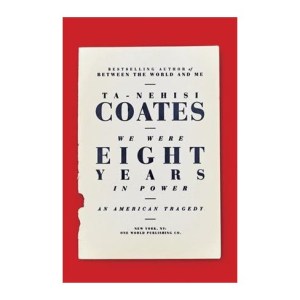
2017, 366P.
Well, according to the blurb on the back of the book that describes it as an “essential follow-up to Between the World and Me”, I’ve read these books in the wrong order because I read this book, We Were Eight Years in Power first. I’m rather embarrassed to admit that I wasn’t even quite clear who Ta-Nehisi Coates is, except that I know that he has been speaking at various Writers’ Festivals around the country in the last few weeks.
This book is a compilation of long-form essays, one for each of the eight years of Barak Obama’s presidency. Each essay is prefaced with a 2018-dated reflection on the article and the circumstances in which it was written. There is a dialogue going on at two levels: Coates explaining and challenging himself as author at an earlier time, and the laying out of an argument from author to reader in the essay itself. These prefaces trace through Coates’ own career trajectory. As the years passed, Coates shifted from an unemployed freelance writer to a public intellectual, who is invited to Obama’s White House to engage with his president in debate. Some of his observations made about Obama in 2008 he continued to hold in 2017, while others moderated or changed over time.
The book starts with an introduction ‘Regarding Good Negro Government’ which explains the title “We Were Eight Years in Power”. It was first uttered by South Carolina congressman Thomas Miller in 1895, regretting the loss of the progress made during Reconstruction, immediately following the Civil War. In this book Coates repeats the lament, noting that
In short, Obama, his family and his administration were a walking advertisement for the ease with which black people could be fully integrated into the unthreatening mainstream of American culture, politics, and myth. And that was always the problem. (p.xiii)
Right from the start of this book, Coates is critical of “respectability politics” which rails against the black community for its lack of personal responsibility. The opening chapter of the book discusses how Bill Cosby promulgated this form of black conservatism (Bill Cosby had not at this stage fallen from grace.) Throughout the following chapters of the book Coates calls Obama out for a similar philosophy. However, over the eight years of the Obama presidency, Obama also stepped into his own identity as a black president, most particularly in his comment after the death of Trayvon Martin, to the effect that if he had had a son, he would look like Martin. This observation, and his comment that police had “acted stupidly” when they arrested Henry Louis Gates sparked up white opposition to the Obama presidency. In his epilogue, Coates argues that this white outrage about the Obama presidency – an outrage based not on income, or class but racism – led directly to the inauguration of Trump – the “first white president”.
I don’t know whether Coates “grew into” himself as a writer, or whether there is a qualitative difference between the earlier essays in this book and the ones that came later. Perhaps the opening chapters were more current (at the time), or required a familiarity with Black History which I don’t have. For me, as a reader, the intensity of his writing really cranked up with his essay from the Fifth Year, ‘Fear of a Black President.’ This chapter was followed by his Atlantic cover story ‘The Case For Reparations’, which was awarded the George Polk Awards. Here, he demonstrates the structural basis of racism in passionate, logical, informed writing. He extends the argument into his Seventh Year article ‘The Black Family in the Age of Mass Incarceration’. The final chapters reflect the sorrow that twenty-first century ‘eight years’ have led to Trump and such a vulgar reassertion of white supremacy. For this is just how Coates calls it – structural racism to bolster white supremacy – without any liberal loopholes.
These are excellent exemplars of the long form essay, running in some cases to over fifty pages in length. They show the shuttling of an argument from the personal to the political and back again, and the balancing of data and anecdote. Perhaps it’s the academic in me, but I did wish that there were footnotes at times, but these are magazine essays, aimed at a more general readership. Coates makes no secret of his admiration for James Baldwin (who, to my shame, I have not read), and from the acclaim Coates’ work has garnered, it would seem that he is a worthy successor.
And yes, I am going to read Between the World and Me
My rating: 8.5
Sourced from: Yarra Plenty Regional Library.

Sounds interesting. ‘Respectability politics’ is a new term for me…
I think a lot of what has happened in US and Austn politics has been reaction to ‘radical’ leadership choices in Obama and Gillard – whose politics of course were disappointingly mainstream.
What a depressing thought that Gillard could have been seen as a ‘radical’ choice.
If you are looking for a good novel by a contemporary African American author I can recommend ‘So Much Blue’ by Percival Everett. I’ll be reviewing the book on my blog soon.
Thanks. I haven’t heard of it.